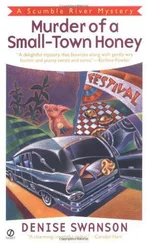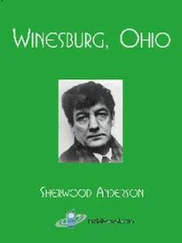Sherwood Anderson - Winesburg, Ohio - A Group of Tales of Ohio Small Town Life
Здесь есть возможность читать онлайн «Sherwood Anderson - Winesburg, Ohio - A Group of Tales of Ohio Small Town Life» — ознакомительный отрывок электронной книги совершенно бесплатно, а после прочтения отрывка купить полную версию. В некоторых случаях можно слушать аудио, скачать через торрент в формате fb2 и присутствует краткое содержание. Жанр: foreign_prose, literature_20, foreign_antique, на английском языке. Описание произведения, (предисловие) а так же отзывы посетителей доступны на портале библиотеки ЛибКат.
- Название:Winesburg, Ohio: A Group of Tales of Ohio Small Town Life
- Автор:
- Жанр:
- Год:неизвестен
- ISBN:нет данных
- Рейтинг книги:4 / 5. Голосов: 1
-
Избранное:Добавить в избранное
- Отзывы:
-
Ваша оценка:
- 80
- 1
- 2
- 3
- 4
- 5
Winesburg, Ohio: A Group of Tales of Ohio Small Town Life: краткое содержание, описание и аннотация
Предлагаем к чтению аннотацию, описание, краткое содержание или предисловие (зависит от того, что написал сам автор книги «Winesburg, Ohio: A Group of Tales of Ohio Small Town Life»). Если вы не нашли необходимую информацию о книге — напишите в комментариях, мы постараемся отыскать её.
Winesburg, Ohio: A Group of Tales of Ohio Small Town Life — читать онлайн ознакомительный отрывок
Ниже представлен текст книги, разбитый по страницам. Система сохранения места последней прочитанной страницы, позволяет с удобством читать онлайн бесплатно книгу «Winesburg, Ohio: A Group of Tales of Ohio Small Town Life», без необходимости каждый раз заново искать на чём Вы остановились. Поставьте закладку, и сможете в любой момент перейти на страницу, на которой закончили чтение.
Интервал:
Закладка:
One of the worst fates that can befall a writer is that of self-imitation: the effort later in life, often desperate, to recapture the tones and themes of youthful beginnings. Something of the sort happened with Anderson's later writings. Most critics and readers grew impatient with the work he did after, say, 1927 or 1928; they felt he was constantly repeating his gestures of emotional "groping"—what he had called in Winesburg, Ohio the "indefinable hunger" that prods and torments people. It became the critical fashion to see Anderson's "gropings" as a sign of delayed adolescence, a failure to develop as a writer. Once he wrote a chilling reply to those who dismissed him in this way: "I don't think it matters much, all this calling a man a muddler, a groper, etc…. The very man who throws such words as these knows in his heart that he is also facing a wall." This remark seems to me both dignified and strong, yet it must be admitted that there was some justice in the negative responses to his later work. For what characterized it was not so much "groping" as the imitation of "groping," the self-caricature of a writer who feels driven back upon an earlier self that is, alas, no longer available.
But Winesburg, Ohio remains a vital work, fresh and authentic. Most of its stories are composed in a minor key, a tone of subdued pathos—pathos marking both the nature and limit of Anderson's talent. (He spoke of himself as a "minor writer.") In a few stories, however, he was able to reach beyond pathos and to strike a tragic note. The single best story in Winesburg, Ohio is, I think, "The Untold Lie," in which the urgency of choice becomes an outer sign of a tragic element in the human condition. And in Anderson's single greatest story, "The Egg," which appeared a few years after Winesburg, Ohio, he succeeded in bringing together a surface of farce with an undertone of tragedy. "The Egg" is an American masterpiece.
Anderson's influence upon later American writers, especially those who wrote short stories, has been enormous. Ernest Hemingway and William Faulkner both praised him as a writer who brought a new tremor of feeling, a new sense of introspectiveness to the American short story. As Faulkner put it, Anderson's "was the fumbling for exactitude, the exact word and phrase within the limited scope of a vocabulary controlled and even repressed by what was in him almost a fetish of simplicity … to seek always to penetrate to thought's uttermost end." And in many younger writers who may not even be aware of the Anderson influence, you can see touches of his approach, echoes of his voice.
Writing about the Elizabethan playwright John Ford, the poet Algernon Swinburne once said: "If he touches you once he takes you, and what he takes he keeps hold of; his work becomes part of your thought and parcel of your spiritual furniture forever." So it is, for me and many others, with Sherwood Anderson.
To the memory of my mother,
EMMA SMITH ANDERSON,
whose keen observations on the life about her first awoke in me the hunger to see beneath the surface of lives, this book is dedicated.
THE TALES AND THE PERSONS
THE BOOK OF THE GROTESQUE
The writer, an old man with a white mustache, had some difficulty in getting into bed. The windows of the house in which he lived were high and he wanted to look at the trees when he awoke in the morning. A carpenter came to fix the bed so that it would be on a level with the window.
Quite a fuss was made about the matter. The carpenter, who had been a soldier in the Civil War, came into the writer's room and sat down to talk of building a platform for the purpose of raising the bed. The writer had cigars lying about and the carpenter smoked.
For a time the two men talked of the raising of the bed and then they talked of other things. The soldier got on the subject of the war. The writer, in fact, led him to that subject. The carpenter had once been a prisoner in Andersonville prison and had lost a brother. The brother had died of starvation, and whenever the carpenter got upon that subject he cried. He, like the old writer, had a white mustache, and when he cried he puckered up his lips and the mustache bobbed up and down. The weeping old man with the cigar in his mouth was ludicrous. The plan the writer had for the raising of his bed was forgotten and later the carpenter did it in his own way and the writer, who was past sixty, had to help himself with a chair when he went to bed at night.
In his bed the writer rolled over on his side and lay quite still. For years he had been beset with notions concerning his heart. He was a hard smoker and his heart fluttered. The idea had got into his mind that he would some time die unexpectedly and always when he got into bed he thought of that. It did not alarm him. The effect in fact was quite a special thing and not easily explained. It made him more alive, there in bed, than at any other time. Perfectly still he lay and his body was old and not of much use any more, but something inside him was altogether young. He was like a pregnant woman, only that the thing inside him was not a baby but a youth. No, it wasn't a youth, it was a woman, young, and wearing a coat of mail like a knight. It is absurd, you see, to try to tell what was inside the old writer as he lay on his high bed and listened to the fluttering of his heart. The thing to get at is what the writer, or the young thing within the writer, was thinking about.
The old writer, like all of the people in the world, had got, during his long life, a great many notions in his head. He had once been quite handsome and a number of women had been in love with him. And then, of course, he had known people, many people, known them in a peculiarly intimate way that was different from the way in which you and I know people. At least that is what the writer thought and the thought pleased him. Why quarrel with an old man concerning his thoughts?
In the bed the writer had a dream that was not a dream. As he grew somewhat sleepy but was still conscious, figures began to appear before his eyes. He imagined the young indescribable thing within himself was driving a long procession of figures before his eyes.
You see the interest in all this lies in the figures that went before the eyes of the writer. They were all grotesques. All of the men and women the writer had ever known had become grotesques.
The grotesques were not all horrible. Some were amusing, some almost beautiful, and one, a woman all drawn out of shape, hurt the old man by her grotesqueness. When she passed he made a noise like a small dog whimpering. Had you come into the room you might have supposed the old man had unpleasant dreams or perhaps indigestion.
For an hour the procession of grotesques passed before the eyes of the old man, and then, although it was a painful thing to do, he crept out of bed and began to write. Some one of the grotesques had made a deep impression on his mind and he wanted to describe it.
At his desk the writer worked for an hour. In the end he wrote a book which he called "The Book of the Grotesque." It was never published, but I saw it once and it made an indelible impression on my mind. The book had one central thought that is very strange and has always remained with me. By remembering it I have been able to understand many people and things that I was never able to understand before. The thought was involved but a simple statement of it would be something like this:
That in the beginning when the world was young there were a great many thoughts but no such thing as a truth. Man made the truths himself and each truth was a composite of a great many vague thoughts. All about in the world were the truths and they were all beautiful.
The old man had listed hundreds of the truths in his book. I will not try to tell you of all of them. There was the truth of virginity and the truth of passion, the truth of wealth and of poverty, of thrift and of profligacy, of carelessness and abandon. Hundreds and hundreds were the truths and they were all beautiful.
Читать дальшеИнтервал:
Закладка:
Похожие книги на «Winesburg, Ohio: A Group of Tales of Ohio Small Town Life»
Представляем Вашему вниманию похожие книги на «Winesburg, Ohio: A Group of Tales of Ohio Small Town Life» списком для выбора. Мы отобрали схожую по названию и смыслу литературу в надежде предоставить читателям больше вариантов отыскать новые, интересные, ещё непрочитанные произведения.
Обсуждение, отзывы о книге «Winesburg, Ohio: A Group of Tales of Ohio Small Town Life» и просто собственные мнения читателей. Оставьте ваши комментарии, напишите, что Вы думаете о произведении, его смысле или главных героях. Укажите что конкретно понравилось, а что нет, и почему Вы так считаете.











